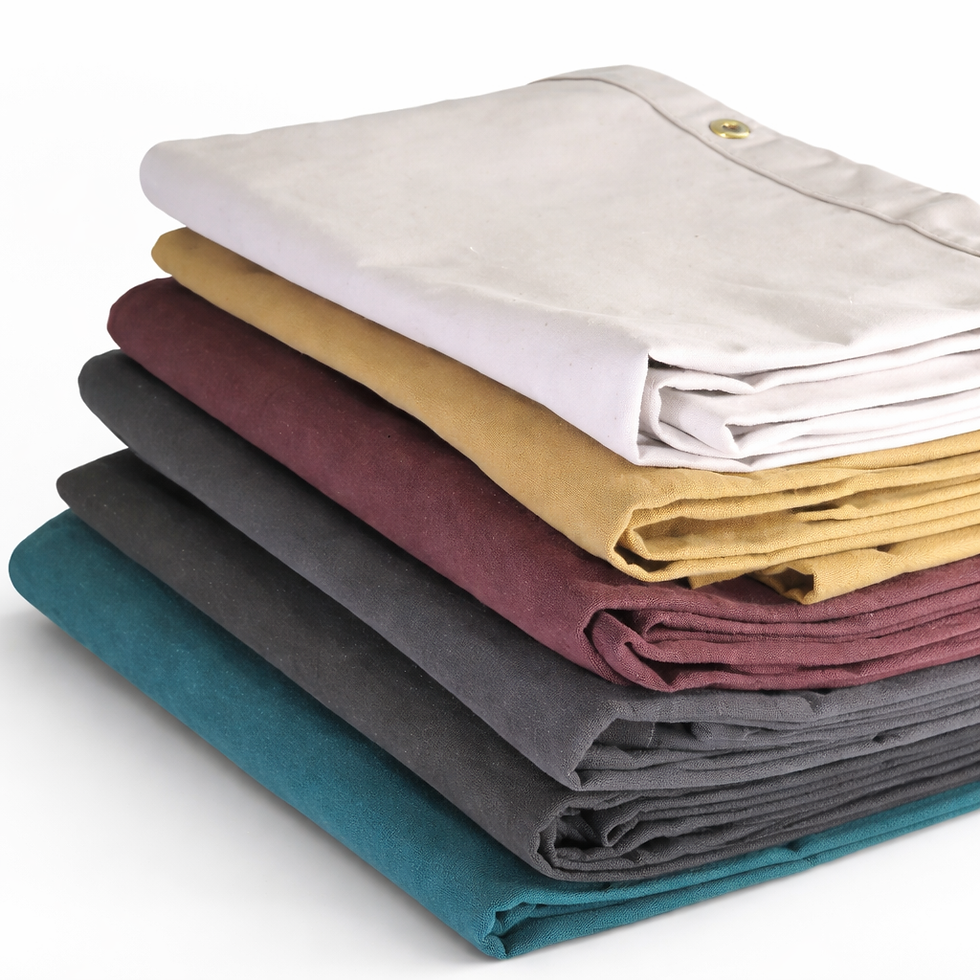Care and Cleaning of Your Canvas Tarps
- Bradley Tomlinson

- Jul 25, 2024
- 3 min read
Hi everyone! Canvas Tarpaulin, frequently basically called tarps, are heavy-duty sheets delivered using canvas or manufactured material, for instance, polyester that are extremely strong and water-safe. They show up in a wide variety of burdens, sizes, and materials to suit different uses.
Storing Your Canvas Tarpaulin Collection
Authentic storage is basic to increasing the lifespan of your canvas tarpaulin collection. Right when not being used, tarps should be kept in a cool, dry spot away from direct sun and soddenness. Here are a couple of prescribed procedures for storing tarps:
Folding or Rolling: Most experts propose rolling instead of folding tarps for conservative storage. Rolling forestalls wrinkling and puts less weight on the texture. Start by folding the Tarpaulin in thirds longwise, then, at that point, roll it solidly from one completion to the next.
Containers: Store rolled or imploded tarps inside plastic tubs, material packs, or different containers for protection. Look for containers with covers to keep residue and bugs out. Stack or layer tarps totally inside the compartment.
Identification: Name each compartment or tarp with a permanent marker to avoid chaos. Note contents like size, weight, and material. This is especially important for those with various similar tarps.
Ventilation: Avoid storing tarps in direct sunlight, which can damage textures for a really long time. Similarly, give wind current — a storage room rack or parking space rafters work well. Make an effort not to store directly on concrete, as soddenness can accumulate.
Heavy-Duty Tarps: Greater, Heavy Duty Tarpaulin made arrangements for postponed outdoor use could benefit from hanging instead of compartment storage. Swing from rafters or walls in a covered region like a garage or shed.
Regular Cleaning and Maintenance
Indoor Tarps: Light cleaning month to month with a delicate brush should take care of business.
Intermittent Outdoor Use: Clean like clockwork or contingent upon the situation.
Incessant Heavy Duty Work: Clean month to month or as observable demolishing occurs.
Simple cleaning methods include:
Brush: Delicately brush surfaces with a delicate fumed brush to unstick free soil.
Compressor or Air: Disregard residue and junk with an air compressor if open.
Hose: Use a light shower from a hose on a low-tension setting to wash.
Repairing Damage
To be sure, even with cautious use and storage, Tarpaulin Sheets could cultivate minor tears or openings long term. Making quick repairs can forestall further deterioration.
Sealing Leaks:
Little cuts or parts can frequently be fixed using a spot of waterproof crease sealant. Apply a restricted amount to the different sides of the texture and smooth over the area.
Reattaching Hardware:
Grommets, ties, or different fittings that have pulled free could a portion of the time at any point be fixed by dealing with new string/rope back through and getting solidly with hitches. Displace absolutely if severely damaged.
Extending the Life of Your Canvas Tarpaulins
Following the consideration, cleaning, storage, and repair methods inspected can fundamentally extend the usable lifetime of canvas tarps. An additional several hints:
Avoid Direct Sun Exposure: UV radiates from the sun can quickly ruin textures long term. Continuously store Tarpaulins UK defended from the components.
Inspect Frequently: Check for damage regularly so issues don't deteriorate at whatever point left dismissed. Month-to-month inspections work well.
Repair Promptly: Cause repairs while tearing or deterioration appears to avoid finding some middle ground.
Rotate Heavy Use Tarps: Exchange which tarp gets the most incessant use to scatter wear similarly among near tarps.
Conclusion
With some fundamental maintenance and care, canvas Tarpaulin Sheet can remain in help for a really long time, saving money versus progressive substitutions. This guide covered acknowledged procedures for expanding the lifespan of any canvas tarpaulin collection. Appropriate cleaning methods, from light cleaning to significant machine washing, help with eliminating soil and forestall advancement for a really long time. Cautious folding or rolling storage in ventilated containers safeguards tarps between uses.









Comments